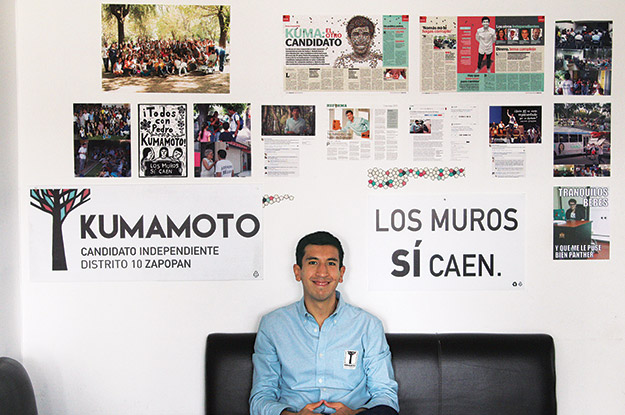This article is adapted from AQ’s most recent issue, “Fixing Brazil.” To see the rest of our Top 5, click here.
At just 26 years old, Pedro Kumamoto flipped the script on Mexico’s governing elite when he helped lead a successful crusade against their most sacred privilege. When the Jalisco state legislature voted in July to strip all public officials of their immunity to prosecution while in office—a measure that he sponsored—the state became the first in the country to do away with what had become a symbol of Mexico’s political impunity.
The achievement came just 13 months after Kumamoto made history as the first independent candidate elected to the western Mexican state’s legislature. That Kumamoto, a great-grandson of a Japanese immigrant with no ties to any political party, was able to convince some legislators to essentially vote against their own interests testifies to his powers of persuasion and the strength of his vision.
“We managed to make them see that we have a new society that will no longer allow them to continue with their vertical, authoritarian models of power,” he told AQ. “We told them that this was going to happen with or without their support, but that they could regain their prestige by supporting initiatives that people care a lot about.”
Kumamoto’s own approach to government makes him an authentic voice for the “new” society he claims is emerging in Mexico. Equipped with only a shoestring budget, he ran his campaign on the anti-establishment slogan “Walls do fall,” (which, for the record, he coined months before Donald Trump launched his U.S. presidential bid). The recent college graduate spent months knocking on doors until he had built up a formidable following in his native Guadalajara, Mexico’s second-biggest city. Representing Wikipolítica, a progressive grassroots movement he cofounded, now active in five of Mexico’s 32 states, Kumamoto forged strong alliances with local academics and activist networks. He vowed to make politics more inclusive and transparent and struck a chord with voters who felt disillusioned by Mexico’s tired politics: He won by a landslide.
In office, Kumamoto practices what he preaches. Declining the perks offered to Mexican politicians, he donates 70 percent of his salary to fund community forums in his district. He says he is only the vanguard of a larger movement. “We like to see ourselves as an extension of civil society, as a social movement that is beginning to take over small parts of Congress, and we hope that little by little Congress will become inhabited by more of these movements,” Kumamoto said. Since his election he has worked with civic organizations on initiatives that include protecting migrants, indigenous Mexicans, women and the elderly—as well as promoting public transportation and environmental measures.
Skeptics predicted that Kumamoto would prove too idealistic and inexperienced to make a difference in a congress dominated by major parties. Yet, beyond his anti-corruption campaign, Kumamoto has also successfully spearheaded a law that makes it easier for Jalisco citizens to launch independent candidacies and enhances their rights to recall officials and vote on how tax revenues are spent. “I feel enormously privileged to be able to dedicate 24 hours a day, seven days a week to making politics more inclusive,” Kumamoto said. “Politics here is dominated by men in their 50s who are mostly upper-class lawyers.
… I want young people, people of sexual diversity and indigenous people, to participate too.”
––
Tucker is a freelance journalist based in Guadalajara, Mexico.





